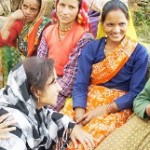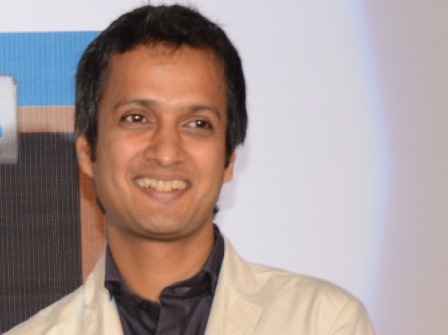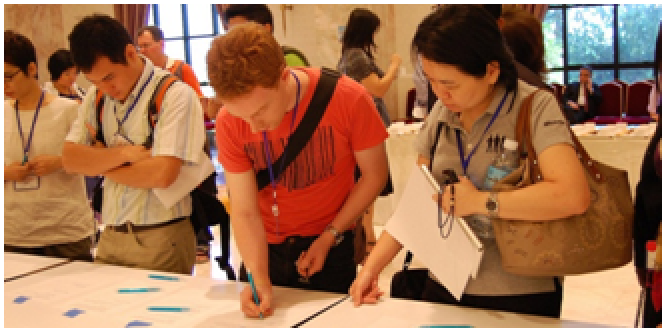Shalabh Sahai, co-founder and director of iVolunteer, talks about starting the country’s first volunteer service enterprise and taking it places.
by The Editors | editor@themetrognome.in
For a country long grappling with a range of issues – from dire poverty to lack of water and public toilets – it is astonishing to note that we have not yet given a serious thought to a basic idea: Helping with time and skill.
Today, NGOs work for the betterment of society in various parts of the country, and several Indians wish to help out many development projects. How to help is the key question, and many of us take the middle ground by donating money towards social causes. But what about actual, on-ground help?
This question led to the creation of iVolunteer, a platform that engages and connects skilled and passionate volunteers with the right social causes in India and abroad. Co-founded by Shalabh Sahai (39), iVolunteer today partners over 300 NGOs and several corporates, and is best known for its innovative models like Whiteboard, GYAN and Impact Projects suited to the skill-based volunteering context in India.
We spoke to Shalabh about starting iVolunteer and what people are actually signing up for when they take up volunteering for social causes. Excerpts from the interview:
Tell us about starting iVolunteer. Why did you feel the need for it?
 I completed my MBA studies in Rural Management from IRMA, Gujarat, and constantly noticed that what was taught in management schools was very different from what actually happened on-ground. It was like we existed in two Indias, with nothing to reconcile the two. This was in 2000, when NGOs were working in silo, and when we founded iVolunteer at this time, we felt the need to break this pattern. Every social cause needs dedicated volunteers, change cannot happen with just NGO work on the ground.
I completed my MBA studies in Rural Management from IRMA, Gujarat, and constantly noticed that what was taught in management schools was very different from what actually happened on-ground. It was like we existed in two Indias, with nothing to reconcile the two. This was in 2000, when NGOs were working in silo, and when we founded iVolunteer at this time, we felt the need to break this pattern. Every social cause needs dedicated volunteers, change cannot happen with just NGO work on the ground.
Many people donate money to social causes, but this is an impersonal contribution. Volunteering involves donating one’s time and skill and is more personal. iVolunteer was started with the idea of matching passionate people’s skills and time with a suitable cause.
What were the initial days of starting iVolunteer like?
In a year of starting, we realised that there were many takers for the idea but not many on-ground conversions. The newer generation does not have a history of working with non-profits, so there was a big disconnect. We realised that we would have to handhold both the volunteers and the NGOs initially.
This was a time when the Internet was being accessed mostly from office, so we had a lot of working professionals making inquiries. There was a lot of skill and passion coming to the table, but these were people who didn’t have too much time to spare. We devised a training module to orient new volunteers.
Which causes are people most interested in?
Education and children. In Mumbai, there were many inquiries for children’s education. People expressed a desire to teach for 2 or 3 hours on a Saturday. But we ask each potential volunteer: are you actually willing to volunteer your time every Saturday? What about social commitments? Many people rethink their initial plan after a while. But there are many others who volunteer their skills. When working with an NGO that works with children, for example, we had a volunteer with an IT background develop an app that helps track counsellor attendance. Or another could help with administrative work. There are many areas in volunteering, you just have to pick the one that matches your skill and passion.
Why would anyone go through iVolunteer when looking for volunteers?
Because we match volunteer interests to community needs and we help strategise the volunteering effort. We are able to align volunteers across geographies, skills and time availability. This saves time and cost for corporates and NGOs looking for dedicated volunteers.
Where is iVolunteer currently?
After 14 years, we have now devised different models of volunteering – short term, long term and overseas. iVolunteer sends about 40 to 50 Indian volunteers  every year to such areas as Nigeria, Mongolia, East Timor, South Africa…they work in the areas of health, HIV/AIDS, NGO management, education, etc. for a little over 1 year. Over 300 Indians have already been a part of this activity.
every year to such areas as Nigeria, Mongolia, East Timor, South Africa…they work in the areas of health, HIV/AIDS, NGO management, education, etc. for a little over 1 year. Over 300 Indians have already been a part of this activity.
Then we have India Fellow, a youth social leadership programme. People under 28 years of age work for 13 months in development projects in a rural or urban setting that takes them away from home. This helps them learn about society in a different context.
We also started JobsForGood, which is a platform to get full time talent in the development world.
Why did you start iVolunteer Awards?
Over 14 years of building connections in the country made us realise that nobody recognises the value of volunteering. Even when people like you and I volunteer, we do it secretly because we feel shy talking about it. This mindset needs to change – we must bring volunteering out in the open and celebrate its spirit. The iVolunteer Awards are a way of recognising excellence and best practices in volunteering today, so that a roadmap can be created and others will be inspired as well.
My aim is to make volunteering sexy, because it won’t sell till then. We need to wake up and realise how important volunteering one’s skills and time is to our development story.

